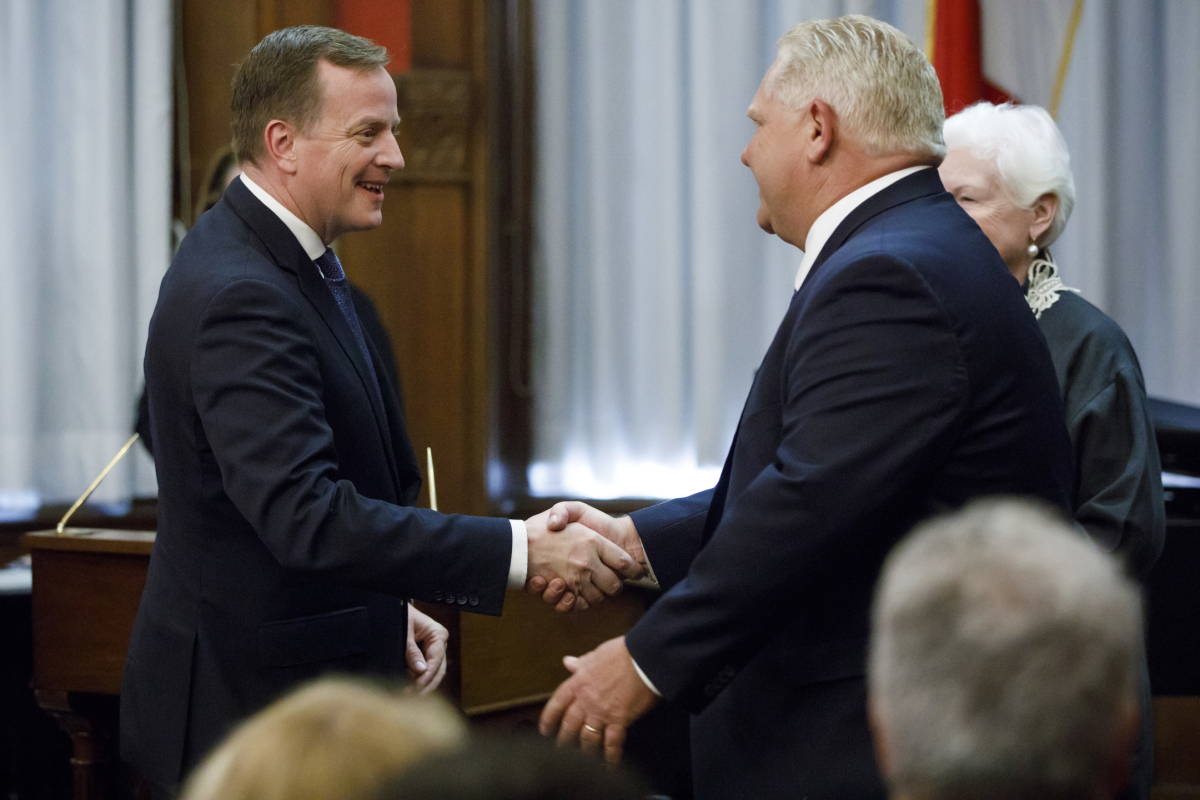Support strong Canadian climate journalism for 2025
Ontario restored environmental protections Monday that the government suspended in April amid the early stages of the COVID-19 crisis.
At the time, the office of Environment Minister Jeff Yurek said the environmental protections could slow down the government’s response to the pandemic. The move came under fire from critics and environmental groups, who called it an unnecessary overreach.
It wasn’t immediately clear why the government revoked the change Monday, and Yurek’s office did not respond to requests for comment.
But in an email to NDP environment critic Ian Arthur, which Arthur provided to National Observer, Yurek said the measure was revoked to coincide with Ontario’s economic reopening.
“As Ontario continues to take a safe, stage-by-stage approach to reopening the economy, it now has a better understanding of the COVID-19 impact and can better manage its effect on the regulated community to ensure continuity of operations,” Yurek wrote.
Arthur said the protections should never have been suspended in the first place.
“The history of this government is such that I’m skeptical of any moves they make to protect the environment,” Arthur said. “We’ll be watching very closely to see where their next attack is going to come from.”
The government's suspension of environmental protections included a key portion of Ontario’s Environmental Bill of Rights. Under it, the government was allowed to push forward projects or laws that could significantly impact the environment without consulting or notifying the public.
The law included a failsafe measure for public health emergencies, but Yurek’s office previously said it would have slowed down the government’s pandemic response to figure out which changes would qualify.
Under the revised rules, changes did not have to be limited to measures related to COVID-19, but Yurek’s office said at the time the protections were stripped the government would continue to notify and consult the public on changes not related to the pandemic.
Ontario Green Party Leader Mike Schreiner called on Yurek to release a complete list of every proposal that was exempt from public consultation “so Ontarians can judge whether these emergency powers were used responsibly.”
“Given the Ford government’s spotty record on environmental protections, there is reason to wonder what projects or regulations were given the go-ahead while this oversight was removed,” he said in a statement.
Though the suspension has been revoked, the changes the government made while it was in effect remain valid.
In the nearly two years since Premier Doug Ford took office, Ontario has cancelled 227 clean energy projects, wound down conservation programs, weakened endangered species protections and has taken away powers from the province’s environmental commissioner, who is meant to hold the government accountable.

‘How do we know that’s all there is?’
On Monday, the government posted a bulletin on Ontario’s Environmental Registry outlining seven changes it made without public consultation while the exemption was in place.
Two were previously reported by National Observer: last week the government allowed petroleum refineries in Ontario to temporarily reduce the number of surveys to detect leaky machinery, and last month, it delayed a deadline for industry to report greenhouse gas emissions. (The deadline change was meant to align Ontario’s deadline with a similar delay on the federal level, Yurek has said.)
The other five measures include a reduced number of mandatory inspections of storage tanks at petrochemical facilities, a six-month delay on the implementation of new rules on excess soil dug up during construction, adjusted electricity rates, extended agricultural licences and measures to allow municipalities to hold off on land planning decisions.
Three of the changes were made last week, days before the government restored the Environmental Bill of Rights.
Yurek’s letter to Arthur noted that the government posted notices for those changes online, even though the exemption meant it didn’t have to.
“Ministries also continued to post over 450 regular proposal notices, with public consultation, for matters that did not require the same urgent action,” the letter said.
But under the exemption, it’s possible for the government to have made more changes without disclosing them publicly.
Robert Wright, a staff lawyer at the non-profit Ecojustice and former vice-chair of Ontario’s Environmental Review Tribunal, said the organization is “guardedly optimistic” that the full environmental protections are restored, but wants assurance that no other changes were made.
“We still have to do the damage control from whatever was done during this period,” he said. “How do we know that’s all there is?”
Elaine MacDonald, a program director at Ecojustice, said she’s concerned some of the changes made by the government during the exemption period were made at the request of industry, rather than because of COVID-19. As an example, she pointed to the government’s move to reduce inspections for petrochemical facilities.
In a June 10 bulletin announcing the change, the government said: “These actions are to support physical distancing and ensure operations can continue and goods and services can be delivered to the people of Ontario.”
MacDonald said the inspections are mostly done outdoors by one or two people, making them a minimal risk for COVID-19. But leaking machinery is a health risk for communities surrounding petrochemical facilities, she added.
MacDonald also noted that the rules mostly apply to facilities in Chemical Valley, in the Sarnia, Ont. area, several of which already have exemptions from air quality standards. Petrochemical leaks and spills are common in Chemical Valley, a collaborative investigation involving Canada's National Observer found in 2017.
“I think it’s just giving them a pass,” MacDonald said.
A June 10 email sent to an air pollution working group, which Ecojustice is a part of, also noted that the change was made “in response to requests from the Canadian Fuels Association and the Chemistry Industry Association of Canada.” (MacDonald provided a copy of the email to National Observer.)
“It’s clear that this is something industry asked for,” MacDonald said.
Arthur said even though the government has restored the full Environmental Bill of Rights, it can use other mechanisms to sidestep green protections. Already, Ontario Municipal Affairs and Housing Minister Steve Clark has issued a series of special orders to approve land use plans from Toronto-area developers, a mechanism that overrides potential opposition, the Globe and Mail reported in May.
Meanwhile, Ecojustice has filed an application for Yurek to review the decision to suspend environmental protections. The review would include any decisions made while the Environmental Bill of Rights was suspended.
Yurek has until July 13 to respond to the charity’s concerns, Wright said.
Editor's Note: This story was updated at 7:42 p.m. eastern to include responses and materials from opposition parties and from Ecojustice, and more details on what the government did during the exemption period.






Comments
The pervasive excuse of governments globally that COVID-19 required them to interfere with environmental regulations is proof positive that the offending industries mounted a full court press to escape the regulations already made or in the pipeline respecting their responsibilities to clean up their acts.
Are they really so stupid as to think that humanity is blind to their malfeasance?